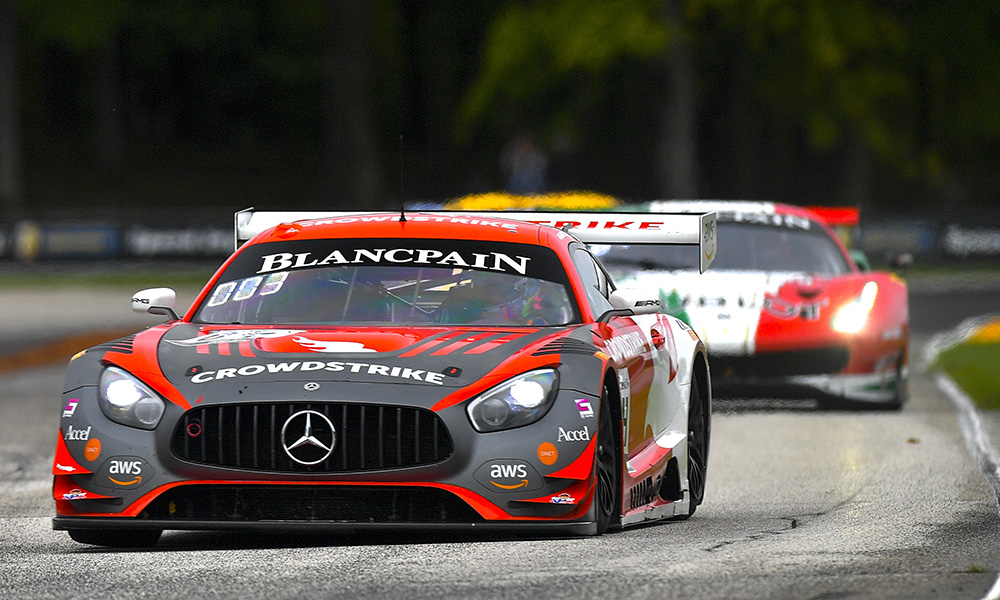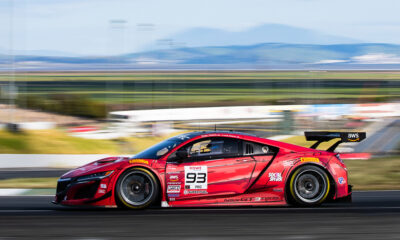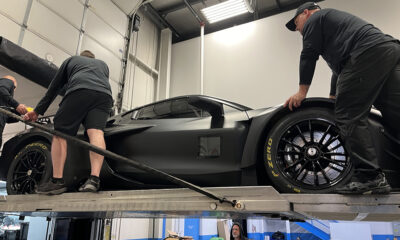
Photo: Gavin Baker/SRO
GT World Challenge America will shift focus to a Pro-Am and Amateur-only series next year in order to better position itself in the North American marketplace, according to SRO Motorsports Group founder and CEO Stephane Ratel.
Announced by Ratel at last month’s SRO Awards night in Las Vegas, all-pro lineups will be eliminated from the GT3 series, which will also see a reduction to six rounds in 2020.
The sweeping changes come in the wake of low car counts, particularly in the second-half of the season which saw the exit of two pro-class Porsche 911 GT3 Rs from Alegra Motorsports, as well as several other entries.
“We had four cars this year: two Bentleys, one Ferrari and one Porsche,” Ratel said. “If I look at Asia, which is basically a Pro-Am series and going from strength to strength.
“In America, IMSA wants the Pros. It wants the factory racing. Let them have it.
“Most important is that you need to find your slot in the market. I still haven’t found the key in America.”
Ratel has likened the changes to GT World Challenge Asia, which began mandating at least one Asian driver or resident per GT3 Pro-Am and Silver Cup entry this year.
“We found the key in Asia the moment we said that we would cut the right branches,” he said. “These billionaire-funded teams would hire European or Australian drivers to win championships, and we needed to cut that branch. We cut that branch and they were unhappy.
“We lost eight cars but thank God they went to Intercontinental GT Challenge when they could have gone to WEC or somewhere else.
“Now, it’s one Asian nationality per car… now it’s blossoming. It is growing fast because you give visibility and a chance of winning to people that were not seen before.
“Maybe it’s a mistake [to eliminate the Pro class in America], but I feel like we should try that because all the limelight is captured by a very small grid of four cars that could become three or remain four.”
While yet to be communicated by SRO Motorports America, the class structure is expected to mirror what’s currently seen in GT World Challenge Asia and the British GT Championship with Pro-Am, Silver Cup and Am classes for GT3 machinery.
Ratel reiterated that Platinum-rated drivers will still be eligible, with the Pro-Am class only enforcing a Bronze driver.
“I think, in America, our analysis of the market is that we are flourishing in Porsche Cup, Ferrari Challenge, which are basically half a million-dollar budgets,” Ratel said.
“And then you have IMSA which is super professional and five or six times more expensive.
“Looking at it, in between, there must be something. We are trying to be in this in-between position with Pro-Am, and we will try to build a grid.
“Look at British GT. It was supposed to be dead three years ago.
“I remember Mark Lemmer [Barwell Motorsport team principal] telling me, in a meeting in his truck and him telling me we must save GT3. Now I look at the number of cars we have this year and I see no weakness.
“[Pro-Am] goes very well because it is the right balance in the market, so we need to find our right balance in America.”
Ratel: Factory GT Racing “A Thing of the Past”
With the automotive industry rapidly moving towards electrification and autonomous vehicles, Ratel believes the days of full-factory GT racing could be numbered.
“Look at racing in general,” he said. “The manufacturers are retracting and leaving everything which is direct factory involvement in combustion engines.
“This is a thing of the past.
“You see that every year they have a revolution ahead of them in electrification and automation. They simply don’t have the resources to finance internal combustion engine competition.
“This is a fact. If you look at the big picture, you can see it clearly.
“DTM is only still there because of our three doctors who came in with an Aston Martin. Otherwise, it won’t be there.
“LMP1 and Hypercar have obviously been difficult. Anything that relies on manufacturers with the old-fashioned engine is a bit of a risk.
“You don’t need to have great [quality] grids, and we are proving it in Asia. To have the whole concept of Intercontinental GT Challenge where you are restricted to a couple of races with real marketing value… at least for them, I will leave, and the rest we will see about.”
Daniel Lloyd contributed to this report

























